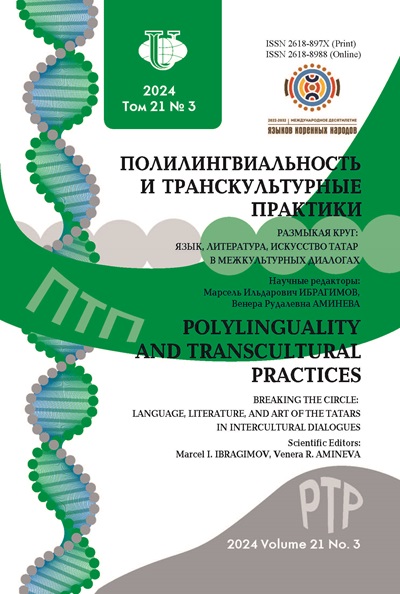Issue
Title
Authors
|
Nagumanova E.F., Shemshurenko O.V. |
|
Kovaleva A.V. |
|
Antonov Y.G., Kabanova J.V. |
|
Bitokova M.V., Kankulova A.S. |
|
Bereznyatskaya M.A., Denisenko A.V., Kalinina J.M. |
|
Lebedeva I.L. |
|
Barannikova T.B., Suleimanova F.N. |
|
Lutfullina G.F. |
|
Mosina N.M. |
|
Grinberg S.A. |
|
Petrov A.A. |
|
Buyinqimike -., Ilina O.A., Naumenko Y.M. |
|
Atabieva L.K. |
|
Vladimirova T.E. |
|
Anikina M.N. |
|
Urkhanova R.A. |
|
Balasanyan L.G. |
|
Belyaeva A.P., Moskovkin L.V., Tskhovrebov A.S. |
|
Vladimirova T.E. |
|
Dorokhova M.V., Sverdlova N.A. |
|
Kuchukova Z.A., Bauaev K.K. |
|
Rudenko-Morgun O.I., Zhindaeva A.G. |
|
Shustikova T.V., Kulakova V.A., Smirnova S.V. |
|
Alexeeva I.S. |
|
Smagulova J. |
|
Lu You -. |
|
Dzhusupov M. |
|
Sukhov N.V. |
|
Rumyantseva N.M., Yurova Y.V. |
|
Ivanova A.S., Soboleva N.I. |
|
Orlova E.V. |
|
Kochergina I.A. |
|
Ndiaye M. |
|
Nazartseva E.A., Chauzova L.I. |
|
Zharkova E.H., Nazartseva E.A. |
|
Tanwar S., Mital R., Balykhina T.M., Perova T.E. |
|
Khegay V.K. |
|
Agmanova A.E., Tokatova L.E. |
|
Medvedeva N.V. |
|
Sinyachkin V.P., Dvoryashina V.S. |
|
Turinova O.O. |
|
Rudenko-Morgun O.I., Arhangel’skaja A.L., Al’-Kaysi A.N. |
|
Nikolaenko S.V. |
|
Bondareva O.V. |
|
Tikhomirova E.E. |
|
Novikova M.L. |
|
Makhankova I.P., Novikova N.S., Serova L.K., Khvorikova E.G. |
|
Skyaeva E.V., Karapetyan N.G. |
|
Fan Guodong -. |
|
Arkhangelskaya A.Z., Zhigunova O.M., Zhindaeva A.G. |
|
Davydova E.V. |
|
Рashkovskaya S.S. |
|
Lavitski A.A. |
|
Vladimirova T.E. |
|
Dzhusupov N.M. |
|
Orlova E.V. |
|
Rostova E.G. |
|
Fierman W. |
|
Wenqian Zang -. |
|
Orlova E.V. |
|
Gerasimova K.M., Temkina N.E. |
|
Budiltseva M.B., Novikova N.S. |
|
Kraevskaya N.M. |
|
Novikova N.S., Pugachev I.A. |
|
Elagina R.I. |
|
Korchik L.S. |
|
Danilova M.V. |
|
Lebedeva I.L. |
|
Al-Kaisi A.N., Koutsoni O.M., Rudenko-Morgun O.I. |
|
Bejenari O.A. |
|
Afanasieva N.D., Zakharchenko S.S., Mogileva I.B. |
|
Maslova V.A. |
|
Arefiev A.L. |
|
Romanova N.N., Amelina I.O. |
|
Karapetyan N.G., Pugachev I.A. |
|
Arkhangelskaya A.L., Zhigunova O.M. |
|
Alimova M.V. |
|
Ballod J.O. |
|
Kudoyarova T.V. |
|
Gartsov A.D. |
|
Wenqian Zang -. |
|
Vladimirova T.E. |
|
Balasanyan L.G., Moskovkin L.V. |
|
Lebedeva I.L. |
|
Lichačiova A.B. |
|
Dronov V.V., Trjapel’nikov A.V. |
|
Sinyachkin V.P. |
|
Shatalova L.S., Shcherbakova O.M. |
|
Guirinskaya L.V. |
|
Li Chuan -. |
|
Balykhina T.M. |
|
Medvedev A.N., Tarasova D.A. |
|
Budiltseva M.B., Varlamova I.J., Novikova N.S. |
|
Voropayeva Y.A. |
|
Shoustikova T.V., Voronkova I.A., Shorkina E.N. |
|
Bejenari O.A. |
|
Mishina N.Y., Antonov E.A. |
|
Araeva L.A., Kereksibesova U.V. |
|
Khudolei N.V. |
|
Turinova O.O. |











